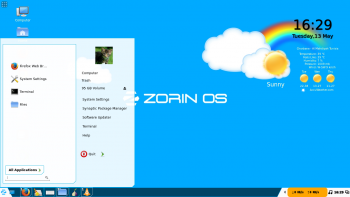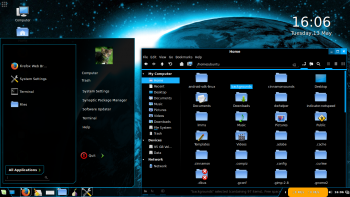I'm a Windows XP and 7 user (and Win98 before that) but not going near Windows 8. So I'm a newcomer to Linux, still trying out different distros. I join and use the forums mainly for advice and help (and am constantly impressed by those who give so much time and attention to troubleshooting other people's problems). So I rarely look at "chatrooms" and only came across this thread by chance.
I read all the posts with interest, but especially the thoughtful contributions by
fixer1234 (is he still around?). Time and again I found myself nodding in agreement, or recognising in his posts accurate reflections of my situation or my feelings. Much of his commentary was about the world of Linux, rather than Zorin specifically - but no less relevant for that.
In particular....
- the Linux world really isn't thinking very much about the wider end-user community (or the customers, in capitalist-speak). Maybe that's because it's free? Because Linux OSs don't see their primary need, or their survival, as dependent on satisfying customer demand (as reflected in sales....) , Linux OSs tend to reflect what the makers like, rather than what the users need. Or as
fixer1234 said, most Linux OSs
"....are not for users, they are a hobby for IT folks...".
- I also had to smile when
fixer1234 said
"in Linux, everything is a work in progress". There is never a finished article with a lifespan in years.
- as a result, the Linux world is still rough and tumble, suck it and see, try anything, run-it-up-the-flagpole-and-let's-see-who-salutes. Confusing to newcomers and outsiders, probably intimidating to many. Although choice is wide and customisation more or less infinite, this can induce a kind of paralysis, or brain-fade, in those many people (I may be one) whose main priority is that the OS should be easy to understand and operate, and should work reliably and flawlessly; if it looks good, that's a bonus...
- most of all, I saw myself reflected in this passage from one of those earlier posts
When a non-technical user tackles Linux, they expect a "Windows" experience. They want to use the computer to accomplish their business, not to learn Linux. They might do a search for the first problem, or the second. They rapidly reach a point where they feel that they're spending more time researching how to make stuff work than doing their business. ......... Everything that doesn't work is another thing the new user has to deal with.
I like challenges and problem-solving, and have a common-sense if not high-tech approach, whether it's making the computer work or fixing the washing machine. So I have not been deterred by the occasional glitch or obstacle in getting to grips with Linux distros, and have appreciated the help offered through the forums. But this thread has offered much food for thought. In a way, this world of computer OSs (Windows, Apple and Linux) is analogous to the world of motor cars (I confess to being a bit of a car-enthusiast).
- Microsoft is the Ford or General Motors of the software world: churn the product out in huge volume, be very clear about customer desire and needs, and give them what they want with only very limited options to specify the GL or Deluxe spec. The drivers will want the ride to be comfortable and the controls user-friendly. Just don't expect the users to do anything under the bonnet except top up with oil, water and antifreeze (= "update"). Anything else, call the mechanic or take it to the garage (and pay for service).
- Apple is the BMW, Mercedes, Lexus or Bentley/Rolls. The product looks superb - slick design, smooth operation, perfect finish. It costs a premium price. It's gloriously easy to drive. Neither maker nor user expects it to go wrong, and no user would want to mess with either the engine or the styling. The products will go on for years, and the owners will be fiercely loyal.
- Linux is - well - it's the world of the custom car, the hot-rod, the souped-up racer, the saloon with go-faster stripes, the 4WD with fat tyres and suspension lifted. The chassis and engine underneath many of these may be familiar. But the range of styles and appearances, the extent of performance tuning, and the air-brush artwork, is absolutely astonishing. This entire community has a few key things in common. The owners/enthusiasts do this first to please themselves, and second to impress their fellow-enthusiasts. They may share their insights and their techniques with relish. But their aim is not to see thousands of others driving exactly the same car. The other point is that the priority is often how fast it goes, not how far it goes; or how good and shiny it looks, not how well it copes in the rain and snow.
So while the production Fords roll on (boringly?), and the Mercs and BMWs glide by, it's the Ferraris, the Lotuses, and the customised vehicles with the go-faster stripes and the furry dice hanging from the rear view mirror that tend to be on the hard-shoulder with the owner turning the start-key in vain or staring perplexed at the engine....
Sound familiar? I'm sure others can develop the parallels even further. Some custom-tuning goes mainstream (Mini-Cooper, Shelby Cobra) and earns respect. But there are garages all over the world with interesting car-projects where owners have run out of time, imaginative tweaking has run out of steam, or frustration has set in; and people have abandoned them and turned to something which will get them from A to B - and back - without fuss, drama or any fiddling under the bonnet.
Which was basically
fixer1234's point. Most people just want an OS that works - every time, all the time - without any pre-tuning or mechanical tweaking. Whereas most Linux distros are dedicated more to playing about with the chromework and the paint-job or the leather seats than making sure the engine runs smoothly and the wheels don't fall off. Once users have a product that they are confident won't break down or crash within the first few months, they are likely to keep it and may want to personalise it. They won't want to be urged instead simply to trade it in for the new model which has just been released and is bound to be better.
My own experience is a good example. I have now test-driven about half-a dozen Linux distros. Each has had its attractive features (in terms of "showroom appeal"). Some have had a more familiar display than others. I have usually managed to adapt to the controls. But
all have failed the drive-away reliability test in one way or another. Some simply wouldn't start (in laptops with non-pae processors). Some wouldn't connect by wifi (headaches with Broadcom drivers). Some had real problems working with my printer/scanner (a mainstream Canon) and needed much "tuning". On one of my computers a Linux distro (yes - it was Zorin) wouldn't display the min/max/close buttons on the top right of each opened window nor the search box and shut-down buttons on the Start menu...
I still want to drive Linux. But I want to find a model that offers (a) absolute reliability, (b) reasonable longevity, (c) user-friendly controls, (d) decent performance and 'road-holding', and (e) low, or simple, maintenance. Only after I am assured of those essential features might I be interested in looking at the paint-job and styling (ie the appearance or desktop-environment).
Am I looking for the unattainable?

